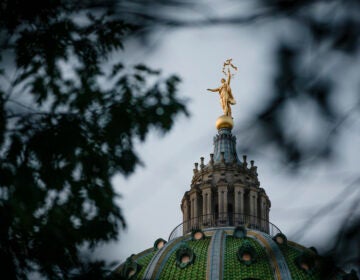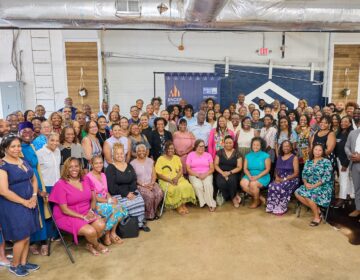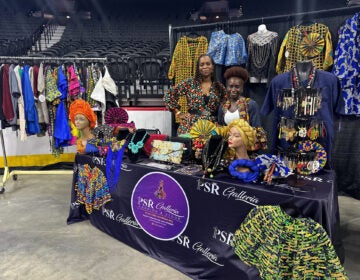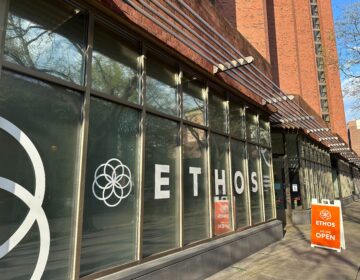Meet the Philly entrepreneurs pushing for social justice in Pa.’s recreational marijuana laws at Black Cannabis Week
Organizers want to prepare Philadelphia entrepreneurs for the opportunity legalized adult-use marijuana in Pennsylvania would bring under a proposed social equity program.
Listen 0:51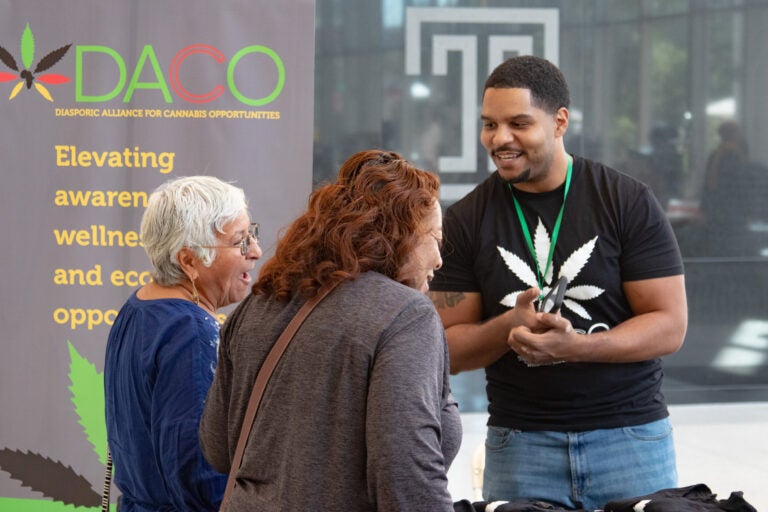
Black Cannabis Week has been an annual event since the medical cannabis industry began to blossom in Pennsylvania in 2018. (James Robinson courtesy of the Pennsylvania Senate Democratic Caucus)
From Philly and the Pa. suburbs to South Jersey and Delaware, what would you like WHYY News to cover? Let us know!
Six years ago, Philadelphia’s first Black Cannabis Week was held to discuss Pennsylvania’s new medical cannabis laws and opportunities in the growing market for entrepreneurs and patients alike.
At the time, organizers expected 300 people to show up, but nearly double that actually did.
Medical cannabis in Pennsylvania has been legal since 2016, but many people in Black and Latino communities didn’t have good access to information about what was possible to help treat their conditions, said Cherron Perry-Thomas, co-founder of Black Cannabis Week and the Diasporic Alliance of Cannabis Opportunities.
Now the discussion is more focused on the potential adult-use recreational cannabis opportunities as there’s a slew of legalization proposals under consideration in the Pennsylvania legislature.
“The only state that does not have adult-use cannabis that we neighbor is West Virginia,” Perry-Thomas said. “We are demanding social justice, demanding equitable legislation, which is something we did not have for our medical marijuana program.”
Organizers seek both the canna-curious and skeptics alike to learn more about the laws and business opportunities around cannabis — more commonly known as marijuana — in the Philadelphia region. While the event is Black-centric, it’s open to the general public and most of the events are free, organizers said.
Here’s what to expect:
- The mid-Atlantic “daily dose” education tour runs between Sept. 22 and Sept. 26.
- The policy breakfast will happen on Sept. 27 at the DoubleTree Hilton in Center City Philadelphia.
- The Social Justice Film Festival is planned on Sept. 27, as is the Blaze the Runway Fashion Show.
- The Cannabis Opportunities Conference will be held on Sept. 28 at the Lewis Katz School of Medicine at Temple University on N. Broad Street.
Black Cannabis Week is much more interactive and varied than other traditional conferences, organizers say, because they wanted to reach a broader audience.
“We didn’t want panels speaking at the audience, we wanted this to be more involved,” said lead organizer Kristal Bush. “We are bringing a film festival, a policy breakfast, a canna family feud and a debate where it’s not the typical set-up. You can pick and choose where you want to be.”
Organizers expect to have a job fair, a fashion show, cannabis-related expungement information for legal records and even a plant competition. But before the conference, they are going on a “daily dose tour” across state lines, including Virginia, Maryland, New York, New Jersey and Pennsylvania.
“We want people to feel empowered to be part of it and feel like their voices and their experiences are of worth,” Bush said.
The concept of social equity for legal cannabis programs is to meaningfully include a path to profit for local businesses led by individuals formerly incarcerated for breaking the law when marijuana was illegal for decades before.
Most of the time, folks with criminal records for marijuana are Black and Latino individuals, which organizers say is unequal because most corporate marijuana players generating profits from the same products legally are owned by white men.
To be clear, it’s still against the law in the eyes of the federal government, despite a change in its controlled substance scheduling under President Joe Biden’s administration.
In 2023, event organizers hosted a policy breakfast in North Philadelphia where the existing medical program and proposed adult-use recreational was discussed at length with lawmakers. That discussion even included a local lawmaker uneasy about too much access to medical marijuana in local neighborhoods and future adult-use dispensaries inside city limits.
Now, it’s a pivotal year as Pennsylvania moves towards an adult-use market with bills in the legislature and a slew of political backers – including Gov. Josh Shapiro – despite vocal Republican opponents.
If legalized, recreational adult-use marijuana in Pennsylvania could generate between $400 million to $1 billion in new tax revenue for the state, according to the Pennsylvania Independent Fiscal Office.

“Sometimes it is difficult speaking to elected officials as well as civic leaders about it,” Perry-Thomas said. “We think this is a civil rights issue. And we just want to make sure folks understand this really may be one of the last opportunities for communities to have some type of justice repairing some of this [War on Drugs policies] harm.”
The popularity of marijuana among its users and its historical controversy from its opponents has led to the proliferation of websites and social media videos on the internet, sometimes with inaccurate information, Perry-Thomas said.
“There are always people saying, ‘I never knew [about cannabis],’ but they’re the perfect candidate to actually be able to take advantage of the opportunities in this industry,” she said. “They have businesses that have survived [the Great Recession] the [COVID-19] pandemic and now we have this [adult-use cannabis] industry that is getting ready to develop in our state and they are not prepared.”
Organizers say they want to make sure Philadelphia consumers, business owners, academia and medical professionals understand at least basic concepts about the industry because there’s a need for more education.
Such as the difference between concepts like the widely legal hemp-derived CBD and controlled substance cannabis-derived THC.
For example, CBD and THC are extracted from the same cannabis plant but are different under the law and have different effects on the body when consumed.
Most CBD products have nearly all of the THC – the psychoactive ingredient that makes somebody feel ‘high’ strained out of the chemical processing by law – with the loophole exception of Delta-8 THC cannabis strains. That means Pennsylvania has an illegal market, a gray quasi-legal loophole market, and a legal market for cannabis products right now.
“It boils down to information, people knowing what their supply chain is, who the farmer that’s growing it, the efficacy of the product,” Perry-Thomas said. “That gray market, it’s been here, and will probably continue.”
There’s been widespread confusion in the market already because not all cannabis products are equal, despite marketing claims.
In Philadelphia, there’s no shortage of “CBD dispensaries” on commercial corridors with cannabis leaf signs and wide open doors, which can be misleading to the public. There are also smoke shops that claim to sell legal cannabis products with little oversight or information about its origin.

But a true legal medical cannabis dispensary in Pennsylvania will have its doors locked, patients need identification, prior approval from the state and a recommendation from a doctor. There’s also a plethora of rules about how to purchase the cannabis products that contain both CBD and THC.
Increasingly, cannabis products are sold at the retail counter with even more cannabinoid compounds than just CBD and THC anyway to keep up with consumer demand – especially sleep aid products like chewable tablets.
There’s also a big difference in the effect on the body when individuals consume cannabis from a Sativa compared to an Indica plant strains, not to mention hybrid plants that have a bit of the two strains.
Ultimately, every individual has their own body chemistry in addition to any potential drug interactions from prescription medications that could occur. But there’s little incentive for education over profit right now because there are no craft makers in Pennsylvania.
“There’s no grassroots [businesses] when it comes to cannabis in Pennsylvania,” Perry-Thomas said. “In other states, you have craft markets, meaning farmers who are actually growing [cannabis] on their land. You have producers that are local and reflective of those communities. But because we have a corporate cloud over our state, we don’t have equitable legislation.”
If adult-use cannabis is legalized in Pennsylvania, Perry-Thomas envisions Philadelphia neighborhoods benefitting from that growth.
“I could see a Fishtown strain, or a North Philly [strain],” she said. “But until we have laws that are changed in our state that won’t be happening, we still have limited choices. It’s just like coffee, just like honey. They’re just like any other retailer, they’re trying to sell you the most for the biggest profit they can make.”
A huge obstacle to growth in the medical cannabis industry is that health insurance companies refuse to cover such medication, so it’s 100% out of pocket costs for patients. There is one CBD product that’s been approved by the FDA for some conditions that could, in theory, be covered by health insurance, but it’s not widely known and was only recently approved.
On the higher education front, Perry-Thomas can see how the state could benefit on that too, especially university research – some of which is already happening.
“Pennsylvania can really take over when it comes to research,” Perry-Thomas said. “We wanted to make sure these institutions are encouraged to start training the next generation of workers and maybe [business] owners.”

Get daily updates from WHYY News!
WHYY is your source for fact-based, in-depth journalism and information. As a nonprofit organization, we rely on financial support from readers like you. Please give today.



